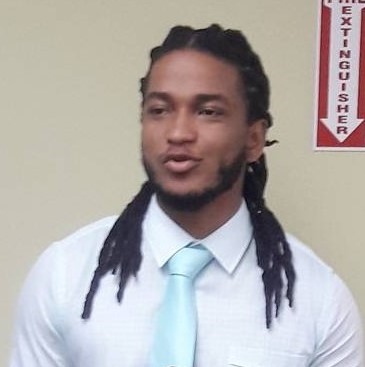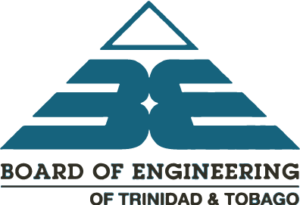
Richard Tyson, MBA, MSc, BSc, PGDip, PMP, R.Eng, MAPETT
A chat with Engineer Richard Tyson, one of the New Faces of Engineering in Trinidad and Tobago
A national scholar, Richard’s interest in the built environment has led him to the field of civil engineering. As a young Engineer, he has developed an exemplary profound commitment to his profession, in that he has pursued professional Registration early in his career development, having completed both Bachelor’s and Master’s degrees in his field of practice.
Richard’s career path thus far has allowed him to acquire a diverse range of experience in the Construction, Oil & Gas, and Public Sectors as he continues to make his contribution in various areas of national development, even while he continues his professional development pursuits. If any young engineer needs an exemplar of what professional commitment means, then that person is Engineer Richard Tyson
Q1. Your professional development path to date as a young Engineer is indeed a testimony to your professional commitment. Can you tell us about your journey to becoming a Registered Professional Engineer and what motivated you to achieve this status?
My journey towards becoming a registered professional engineer began in the early stages of my career working in organizations such as the Ministry of Works and Transport, as well as the Petroleum Company of Trinidad and Tobago (PETROTRIN), where I was able to develop robust first-hand experience in designing different types of infrastructure and managing a variety of projects. This allowed me to appreciate the fact that what we do as civil engineers have a tremendous impact on the quality of life in a modern society
Based on the levels of complexity and ambiguity which are sometimes present in the design process, the importance of always striving towards maintaining the highest levels of technical standards began to resonate with me, as the quality of life of persons is directly dependent on the integrity of the engineering designs. I was therefore motivated to becoming a registered professional engineer as this is a direct reflection of a commitment to upholding the highest standards in the profession.
Q2. What are the responsibilities that come with your current job?
My current portfolio as the Manager of Estate and Operations at the Chaguaramas Development Authority (CDA) involves providing strategic oversight to multiple departments, including the Facilities Department, the Project Management Office (PMO), the Health and Safety Department and the Information Technology Unit, with the aim to ensure efficient operations of both the organization and within the overall Chaguaramas region. Daily focus is placed on the development and maintenance of the Northwest Peninsula and its subsidiary offshore islands. The intention is to create an environment conducive to eco-tourism, as well as overseeing strategically-conceptualized infrastructural projects which are generally oriented towards encouraging investment and corresponding socio-economic development within the peninsula. A large part of my duties also includes frequent stakeholder consultations to ensure that initiatives being carried out by tenants and other stakeholders in the region comply with the applicable statutory regulations.
Q3. What technical skills helped you achieve this position?
I would say project management is the most relevant technical skill which allowed me to achieve this position. It is a skill which is applicable to numerous technical disciplines, but more so in the field of engineering and operations management, since there is always a need to ensure that the right parameters and structures are in place to facilitate the timely and cost-effective achievement of objectives. Managing the various components of project management, including resources, budgets, timelines, quality parameters, communication and stakeholders, and successfully integrating them all, is for me the key in being able to function in a position as this.
Q4. What nontechnical skills helps you in this position?
Experiences from a managerial standpoint have shown me that the most useful non-technical attributes are interpersonal skills. Being able to communicate effectively with others enable a holistic understanding of the different cultural dimensions in an organization. This allows you to recognize the preferences of individuals, such as favoured modes of communication so that you are better able to function either individually or collectively as a team member. These considerations have made it easier for me to implement the best approaches regarding formulation of cohesive teams, and obtaining the most efficient levels of productivity from my team.
Q5. You have worked with a number of public sector organizations, but you consider your prior engagement at the East Port of Spain Development Company to be the most rewarding. As the former Manager of the Project Unit at that organization what about it that gave you such satisfaction?
My responsibilities as manager of the project unit at the East Port of Spain Development Company included oversight of various project related initiatives geared toward the development of the East Port of Spain community. This included much needed infrastructure projects as well as socially-focused capacity building programmes. However, the reason I consider this stint to be very rewarding is based on the unique vulnerabilities faced by residents of this marginalized community, and the noticeable impacts which engineering initiatives have had on residents of the area.
It is rare for engineers to interact directly with the people who benefit from what they do, so there is tremendous fulfilment in achieving successful outcomes of crucial initiatives and witnessing the profound impact which such achievements have on a community. One such initiative is a rainwater harvesting programmes, which facilitated the provision of much needed water supply to households. Another important initiative was accessibility improvements that involved extensive upgrades of the underdeveloped and hazardous pedestrian infrastructure that puts pedestrians at risk as a result of the high level of vehicular traffic prevalent throughout the community.
I was also able to spearhead and streamline the Latrine Eradication Programmme (LEP), which entailed the construction of hundreds of bathroom facilities over various cycles, assisting multitude of residents who live under unsanitary conditions associated with the use of pit latrines and without access to sanitation utilities which the majority of us take for granted. Every project, no matter how small, brought an appreciable level of relief to many families and this made the efforts highly rewarding.
Q6. How do you plan to continue your professional development now that you have achieved registration status? Are there any specific areas of specialization or skills you are interested in further developing?
The field of civil engineering encompasses continuously developing areas where modernized approaches are constantly being introduced. I intend on keeping up to date by maintaining familiarity with the wealth of resources available from the professional associations with which I am affiliated. I also have a deep personal interest in the field of Urban Development and Regional Planning, as my work experiences in communities have shown that it is closely intertwined with the field of Civil Engineering. I therefore plan to pursue a doctoral degree in Urban Development and Regional Planning, with the aim of developing adaptative frameworks which can support growth of urban areas and contribute to the socio-economic development of Small Island Developing States (SIDS) such as Trinidad and Tobago.
Q7. What quote or principle do you try to live by in your work or personal life?
I stand by the belief that there is a solution for everything. I believe that there is no challenge which you can possibly face that has not already been encountered and overcome by someone else. Hence from a professional standpoint, with the right kind of research, collaboration and initiative, a solution for any problem can be engineered, and I believe this is applicable to situations in personal life as well.
Q8. Can you discuss a specific project or experience from your engineering career that you believe exemplifies your readiness and competency as a professional engineer?
Previously working in a unique community such as East Port of Spain with its distinctive social, economic and environmental characteristics I have encountered challenges where traditional engineering, construction and project management practices are sometimes not applicable as may be assumed in theory. These challenges included attempts to test your ethical values, the need to develop innovative engineering solutions to overcome conditions resulting from widespread unregulated land-use practices, and the need to developing specific operational strategies to overcome the obstacles associated with the territorial culture of some stakeholders. I believe that being able to achieve successful outcomes under such diverse conditions attests to my preparedness and competency as a professional engineer.
Q9. Finally, what do you hope to achieve or contribute to the engineering profession in the coming years, now that you have a professional engineering license?
I hope to continue contributing to the development of various sectors of society, and improve processes currently existing in organizations, as there is always room for improvement and development. I hope also to continue to assist in raising the level of commitment to the engineering profession. In doing so I would like to make others appreciate and embrace specific concepts such as the importance of value engineering which is crucial, based in particular on our country’s economic circumstances, as we need to constantly ensure that our engineering endeavours are streamlined to reduce wastage and achieve maximum cost effectiveness.

